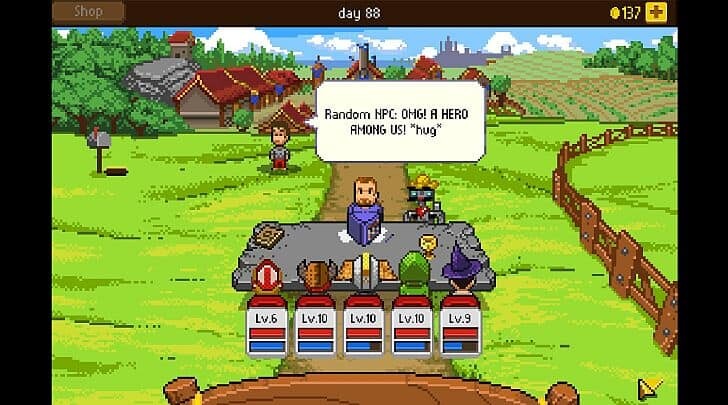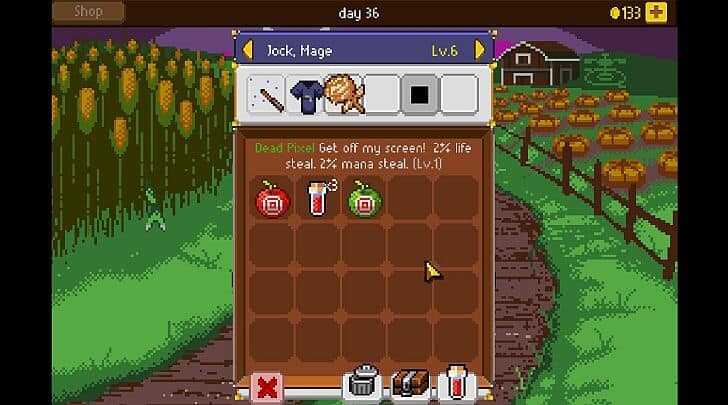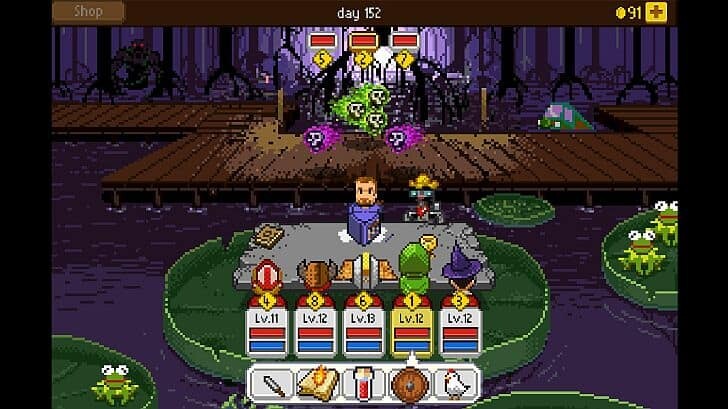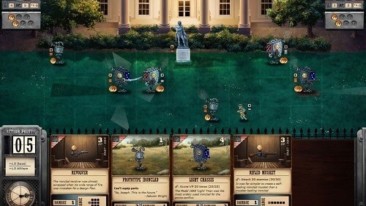Knights of Pen & Paper: What We Think
Dear Knights of Pen & Paper, I apologize for using your review to say what I am about to say. You are just the catalyst, randomly selected, and I didn’t mean to single you out. You’re a nice game, and I promise to talk about you after what follows.
Letting Off Some Steam
I’m just gonna come right out and say it: I hate in-game/app purchases. Heck, I hated the birth of paid DLC’s. I hate it all so much that one of my favorite games is the satirical DLC Quest that lampoons the tiresome, irksome, ubiquitous terrible habit that has become the IAP (in-app purchase) – from Plants vs. Zombies 2 to the countless “Freemium” (I loathe that word) RPGs, RTSes, MOBA’s, MMOs and Space Sims that are always promising that they are not “pay to win” and thus spend most of their time focusing on balancing that, rather than improving the core game mechanics and thinking about excellent ways to update it for the gamers who already opened their wallets and invested in them and not on of the hundreds of thousands of other choices out there.
They are lucky they even get paid at all; if it wasn’t for the inroads that Valve Software‘s Steam cloud-based game market made to curbing rampant piracy by convincing a very jaded consumer base – sick of lost serial numbers and poor tech support – that Achievements and cloud-synced games were the way to go, the games industry would be in the same shitter that the music industry found itself flushed into, and we all just watched it burn, for all its greed and hubris.

Kick Me Once, Shame on You…
And let’s not forget the ensuing abuse of the once-incredible crowdfunding system. With too many of these Kickstarted projects now gone awry, (Code Hero being the unfortunate standout cautionary tale) I get more solicitations to promote fund-raising campaigns for games that may not ever exist than I do for actually finished games, let alone good ones.
But there are beacons of hope: Valve, for one, and what they did with Team Fortress 2 and its creative expansions, additions and so on. Klei Entertainment – and the way they developed Don’t Starve (link to our review), without ever even charging for the myriad sizable expansions and updates. Natural Selection 2 , for the same reason. There is a proper way to deal with your customers, and that is: deliver a great imaginative new product, have people like it, listen and interact with them, but remain firm in your vision, rather than let yourself be tossed around by internet opinion, and then expand with them. They will tell friends. They will invite their friends to purchase the game so that they can share war stories. Good things will happen.
Starving for Change
I should make the disclaimer that Klei did start Don’t Starve as a paid beta. This veers on another habit that can be abused – that is, calling your game ‘beta’ as though it is an excuse to release a title that is buggy and incomplete, even though once people are paying for it, it is pretty much a commercial release, by definition. But hey, this is the world of independent game development. It is a tough racket, and there is no studio – or even distributor in most cases – paying for the game, so the money has to come from somewhere.
All good. I get it. I forgive you for using Kickstarter and IndieGogo and asking people to pay for your beta, and maybe even for the DLCs. OK, let’s be friends again.
But you know what I really have a hard time making friends with? Games that ask me to pay real currency for gold or lives so that I can continue to play the game I already paid for. Well, you say, what about the coin-operated universe? What about popping a quarter every time you want to continue a game of Metal Slug 3 or Pac-Man?
Well, I didn’t have to make a downpayment of $5-$25+ dollars to play those, did I?
Insert Milk Money to Continue
See, the thing about games that are not implicitly designed to create that quarter-grabbing by being really hard (see Volgarr the Viking (Steam link) for a game I would NEVER attempt in a coin-op arcade for fear of going bankrupt) is that it breaks not only the good faith that you, the developer, made a game for me to be challenged by in earnest and enjoy, but also the suspension of disbelief.
I play games to be challenged, transported, entertained. I certainly do not buy them so that I can be solicited for more monetary handouts. You know? Kind of like that awesome street magician who just blew your mind with a card trick but then walks around afterwards asking for a dollar? It just kinda sours the sense of wonder, and instead makes you feel like you just got conned.
Yes, everyone needs to eat. But there are the matters of tact, goodwill, enjoyment, return customers, word-of-mouth, and all that that should come first. There are just too many other options for you to leave the player who took a chance on your offering, with sour grapes. As the seller of a product, the owner of your own business, or even the imagineer who strives to spark the adventures for countless others – are you in it for the long-term or the short term?

Visa Victory
But the issue goes beyond the moral or customer retention problem, to one about design. When I am in the middle of an intriguing gaming experience and going along with you for the ride, it removes all tension, when simply opening my wallet means that the failure state is removed. If I know that it doesn’t really matter if my characters will perish based on my decisions and developing skills within your game world, then why should I even bother to try?
These days the panhandling has become pretty audacious – not just talking a little extra loose change here – some freemium titles ask for upwards of a hundred dollars (aka whatever the market will bear) just for infinite virtual Whatevers that render the game completely pointless, since all the stakes have been effectively nullified.
Old School, New Ways
It pains me when a game like Knights of Pen & Paper suddenly asks me if I want to buy more gold in exchange for real cash when my lives or in-game currency run out. Because this is a fun game, wherein they break the fourth wall to invite you into a chips-and-dip-style night out with some buddies to play good old “paper and dice” D&D in old Final Fantasy-based combat.
I suspect they wanted to go for wide release, having launched versions for iOS and Android (along with PC, Mac and Linux versions via Steam); two platforms where IAP’s have become de rigeur – hey, no one will notice a few impulse buys. But when migrated to a computer platform, the sleight becomes far more evident and glaringly out of place, insulting even. That said, KoP&P would be a terrific game to play on a tablet, and you should buy it for your iPad.

Yes, some of the quests are a bit grindy and clichéd, but the game knows this, and even tells the player with a wink: “Here is a farm where you can grind out some XP.” But there is also a fun, well-written campaign, with fresh, funny dialogue, and some legitimately nostalgic homage-paying to the 80’s when dungeon crawling with some chums was the best thing to do on a Friday night.
Game Proper
At the start of the game, you purchase a seat at the table for one of several classes, in addition to a pop-cultural archetype – from the Pizza man to your grandma, each with their own intrinsic bonuses – that creates a huge variety of customizable characters that will occupy one of five seats.
The graphics are of a 16-bit style, ever-so-popular with the indie set, with bright and colorful pixel-art environmental backgrounds popping in behind the avatars when locations change. Before you stands a DJ, I mean, dungeon master, who talks you through your journey in ultimate po-mo fashion…
Combat shows each character and monster’s individual initiative score, and each proceeds to roll dice to make its attacks on whomever they select. Each of your characters has a unique set of special skills that burn magic points, and several equipment slots for donning further stat modding gear.
At the start of a battle, you get to choose how many of a certain type of enemy you want to take on; the higher the number, the bigger the XP bonus your group will get. It’s a cool little combat and leveling system all around – not earth shatteringly new, but transparent and interactive enough to feel like you have some semblance of agency in your quest to save the universe, or whatever.
Dungeon Mastery
I like this title, I recommend you try it. I spent hours playing it on my very first session, got four Steam trading cards and a half dozen achievements before I even came up for air. Anyone who says “Why not just play real D&D with some real friends?” are more than welcome to do so, but not everyone still has friends willing to find a babysitter, drive across town and commit to learning the new rulesets. But hey, maybe you invented your own Quest creation system and know some porn stars who want to play with you. If that is the case, this game is also not for you.
Knights of Pen & Paper is an easy pickup game for some legitimate solo Ravenloft-era 1d20 Hot Tub Time-Machining. I just wish this micro-transaction stuff would go away – in fact I am only docking the game a half-point for all my ranting (just needed an excuse to get that off my chest) – so I, we, could all smack the price of admission down on the table upfront and get down to meeting a stranger drinking mead on a cold winter’s night in a dark tavern by the flickering fire, who sends you out to the nearest caves where there are rumored to be goblins, in search of stray travelers, weary from the perilous roads in pursuit of a dragon’s gold…
Knights of Pen & Paper – Official Site at Behold Studios
Get Knights of Pen & Paper for iOS at the iTunes App Store
Get Knights of Pen & paper for Android
Get Knights of Pen & Paper on Steam
[xrr rating=”4/5″]
Watch the official trailer for Knights of Pen & Paper below:



